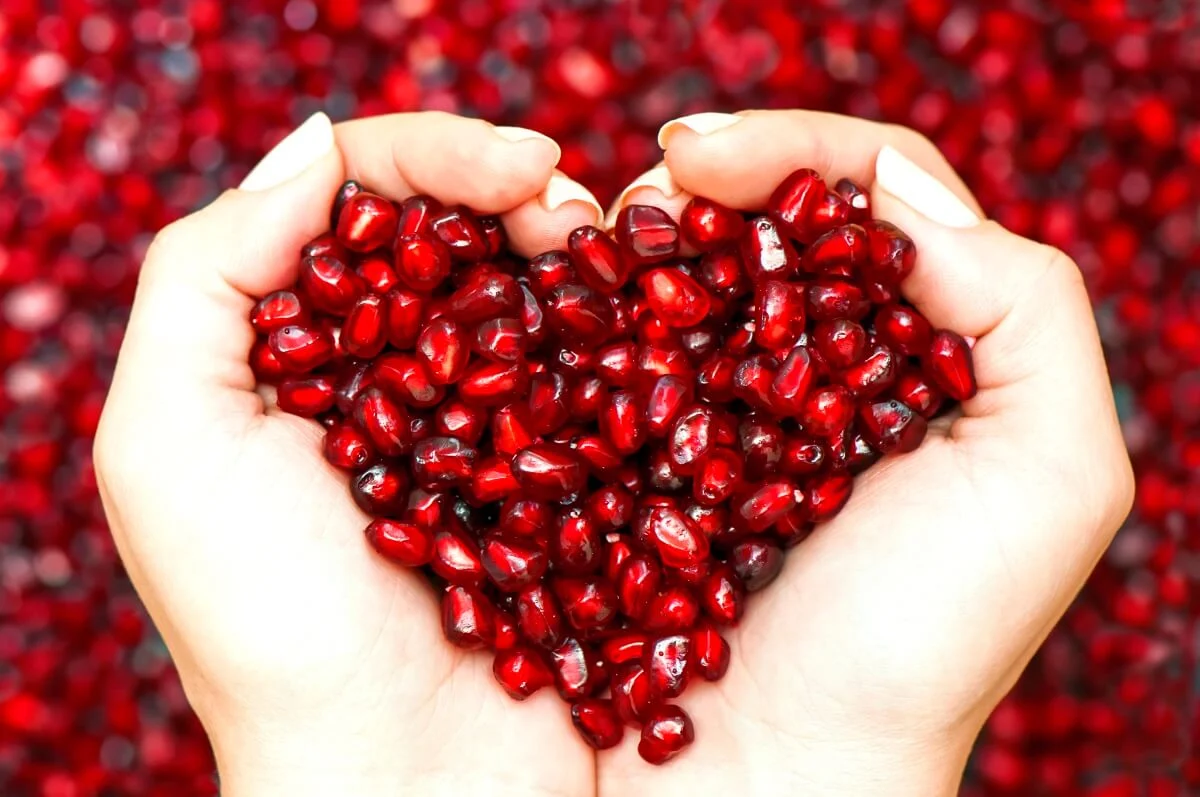

wordpress-seo domain was triggered too early. This is usually an indicator for some code in the plugin or theme running too early. Translations should be loaded at the init action or later. Please see Debugging in WordPress for more information. (This message was added in version 6.7.0.) in /home/sehatnagar.com/public_html/wp-includes/functions.php on line 6114
Pomegranate is a fruit that comes from the Punica granatum tree. It is known for its vibrant red color, juicy arils (seeds surrounded by pulp), and sweet-tart flavor. Pomegranates are rich in antioxidants, vitamins, and minerals, making them a nutritious choice. The fruit is typically consumed fresh or used in various culinary preparations, such as juices, smoothies, salads, sauces, and desserts. But Is Pomegranate Good for Weight Loss? In the quest for effective weight loss strategies, many people turn to natural remedies and superfoods. Pomegranate, a vibrant fruit packed with antioxidants, has gained popularity for its potential health benefits. Pomegranates have been associated with several health benefits, including improved heart health, reduced inflammation, and potential anticancer properties.
This article explores whether Is pomegranate can truly aid weight loss and examines the scientific evidence behind its effectiveness. So, let’s start by its overview
Pomegranate (Punica granatum), or Anaar, has a long and fascinating history. The bright red edible arils symbolised sanctity, abundance, and fertility in ancient Greece and Rome. However, the modern world also celebrates it for its nutritional benefits.
Pomegranates are a wonder fruit. Due to the presence of polyphenols, they act as potent antioxidants. In addition, the red colour makes it a beautiful fruit. Pomegranates are full of nutrients. Compared to other fruits, pomegranate has a higher content of antioxidants. In addition, they contain around three times as many antioxidants as either red wine or green tea. By reducing low-density lipoprotein, or bad cholesterol, it protects the heart. Moreover, it helps increase immunity and metabolic rate, which results in weight loss.

Pomegranate is a fruit renowned for its vibrant color and delicious taste. It also boasts several nutritional properties that contribute to its potential health benefits. Here are the key nutritional components of pomegranate:
As per USDA, 100 grams of pomegranate hold the following nutritional values.
Pomegranate is a nutrient-dense fruit often associated with weight loss due to its moderate fibre and low-calorie count. The fibre in pomegranate helps promote satiety, reducing overall calorie intake and promoting weight loss. Additionally, pomegranate contains polyphenols, which may help boost metabolism and increase fat burning.
A human study showed that administering 120 mL of pomegranate juice daily for one month significantly decreased fat mass in adults. One of the mechanisms by which pomegranates can participate in managing obesity is through regulating appetite. However, it is essential to note that while pomegranate can be a helpful addition to a weight loss diet, it is not a magic solution. One should consume it in moderation as part of a balanced diet and healthy lifestyle.
To lose weight, you must be on a calorie-deficit diet. As a result, it is crucial to include low-calorie meals in your diet. Pomegranates’ low-calorie content is one of their attractive features.
One hundred grams of pomegranate has 83 calories. Hence, you can include them in your diet without worrying about your calorie intake.
Maintaining a healthy digestive system requires fibre. Foods with a lot of fibre, like pomegranates, are crucial for weight loss. Fibre tends to bulk up in your stomach because it absorbs water. Therefore, foods high in fibre can help you stay full for a long time and reduce the need for frequent snacking. It, in turn, aids in calorie restriction and encourages weight loss.
The minerals folate, vitamin K, vitamin E, vitamin B6, and potassium are abundant in pomegranates. These nutrients are crucial for body weight maintenance because they support a healthy metabolic rate, which enables your body to burn more calories. Studies show it also prevents metabolic syndrome.
Polyphenols, especially anthocyanins, which are natural fat burners, are abundant in pomegranates. Polyphenols are in plants. These substances support your general health. They aid in weight loss by accelerating metabolism and increasing calorie burn. So a diet high in polyphenols can help lose weight and prevent the body from storing fat. In addition, studies show it can help prevent and manage various diseases.
Here are some notable health advantages associated with pomegranate consumption:
Servings: 4
Total time: 25 minutes
Servings: 3-4
Total time: 5 minutes
Overconsumption of pomegranate may pose certain risks, although it is generally safe and well-tolerated. One potential concern is allergic reactions. While rare, some individuals may be allergic to pomegranate or its components. Allergic reactions can manifest as mild symptoms such as itching or hives, but in severe cases, they can cause difficulty breathing or even anaphylaxis. If you experience any allergic symptoms after consuming pomegranate, it is important to seek medical attention immediately.
Another consideration is the fruit’s natural sugar content. Pomegranate contains natural sugars, which contribute to its sweet taste. While these sugars are not necessarily harmful, excessive intake can contribute to an increased calorie intake and potentially hinder weight loss efforts. It is crucial to practice moderation and include pomegranate as part of a balanced diet.
Pomegranate juice may also interact with certain medications. For instance, pomegranate juice can inhibit enzymes in the liver responsible for metabolizing certain drugs, potentially affecting their effectiveness or increasing their side effects. If you are taking medications, particularly those metabolized by the liver, it is advisable to consult with a healthcare professional before consuming pomegranate or its juice.
Pomegranate seeds can be difficult to digest for some individuals, particularly those with gastrointestinal conditions such as irritable bowel syndrome (IBS) or inflammatory bowel disease (IBD). The high fiber content in pomegranate seeds may aggravate symptoms such as bloating or gas. It is recommended to listen to your body and adjust your consumption accordingly if you experience any digestive discomfort.
Try adding pomegranate to your morning smoothie bowl! Simply blend some frozen berries, banana, spinach, and a handful of pomegranate seeds for a delicious and nutritious breakfast to keep you full and energized throughout the morning. You can also top the smoothie bowl with more pomegranate seeds and granola for an extra crunch. Try it and see how this tasty twist on a classic breakfast can help you lose weight.
Although research on pomegranate’s direct impact on weight loss is limited, several studies have explored its potential health benefits:
To harness the potential benefits of pomegranate for weight loss, consider the following tips:
Rapid Weight Loss Diet Plan: How To Lose 5kg In 5 Days
Is Muskmelon Good For Weight Loss?
While pomegranate offers numerous health benefits, it should not be considered a miracle solution for weight loss. It can, however, be a valuable addition to a balanced diet and healthy lifestyle. Incorporating pomegranate into your weight loss plan, along with regular exercise and proper nutrition, may contribute to overall success in achieving and maintaining a healthy weight.
A: Pomegranates get fully packed with antioxidants, which are suitable for you and help boost your immunity and metabolic rate, enabling you to lose weight. In addition, it is high in fibre and low in calories.
A: Pomegranates get loaded with essential nutrients. It is rich in fibre, calcium, iron, potassium, magnesium, phosphorus, folate, vitamin C, and K. These nutrients benefit your health in several ways, including bone health, skin health, low cholesterol levels, regulation of blood sugar and high blood pressure, and many more.
A: Compared to other fruit juices, pomegranate juice has a high amount of antioxidants, notably polyphenols. It contains around three times as many antioxidants as either red wine or green tea. In addition, reducing low-density lipoprotein, or bad cholesterol, protects the heart. Therefore, it can help in weight loss and prevent weight gain. Drink pomegranate juice that is 100% pure, with no added sugar.
A: Certainly, it is safe for weight watchers and very beneficial. It has fewer calories, moderate fibre, and antioxidants, significantly assisting in weight loss. It also boosts one’s metabolism.
A: The recommended amount for pomegranate consumption is 1 cup or 250-300 grams daily for weight loss. You can include it in your everyday diet in a variety of ways. Moreover, pomegranate juice is beneficial for health. However, whole fruits are better because juicing removes the fibre content.
A: You can include pomegranates in between your meals as small snacks on your weight loss journey. It is high in fibre which will aid in weight loss. And since it has a low-calorie count, you do not have to worry.
A: Pomegranate is well-known for boosting your metabolism. It is rich in antioxidants, polyphenols, linolenic acid, and other essential nutrients and bioactive compounds that help to burn fat and increase metabolism.
A: No food or fruit directly can reduce belly fat. To lose weight, the body needs to be in calorie-deficit mode. Both belly fat and total body fat will eventually decrease.
A: There are several ways to include pomegranate for weight loss. Some best ways are containing pomegranate seeds in your salad, adding seeds to your curd, and having it with oats porridge or a smoothie bowl.
A: There are hardly any side effects for pomegranate for weight loss. However, eating more than the advised daily quantity may have undesirable results. Too much pomegranate may cause severe constipation, intestinal blockage, gas, and bloating.